How I learned to love my hair after years of abusing it
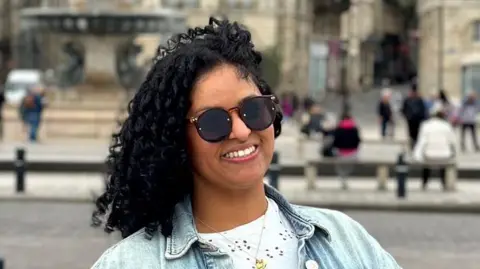 Michela Riva
Michela RivaCurly hair is more than just a hairstyle. It is a choice you have to keep making - or at least it is for me.
I spent years abusing my juicy thick curls with 200°C heat in an effort to fit in with the crowd.
But it's when I became pregnant with my daughter that I started to question why I was straightening my hair.
I wanted to be a role model to her and instil in her a sense of pride about her hair and her heritage - but my journey to hair enlightenment has not been without its challenges.
For many black people and those of mixed heritage, curly hair is a symbol of identity, culture and even acceptance.
Social psychologist Dr Johanna Lukate points out that there is a "social tax" on curls, leading to "internalised and even generational trauma" for some.
And it's not just black people who feel the need to disguise their natural hair.
"There is a dominant beauty idea that basically everyone is held against... so it makes sense that if the dominant beauty ideal favours long straight hair [that] this applies to everyone, irrespective of whether you have brown, blonde or black hair," said Dr Lukate.
Finding experienced hairdressers who really understand curls is an issue for many people, particularly in smaller cities and towns across the UK.
My own journey of curly hair rediscovery is tangled up in my African-Italian heritage.
Growing up in south Wales, I remember my kind of hair being described as bushy, frizzy and "wild" - like something that had to be tamed.
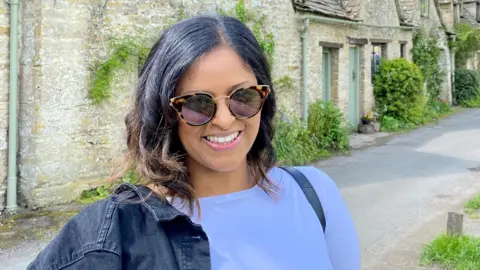 Michela Riva
Michela RivaAt the age of 14, I begged my mum to take me to the hairdresser and fork out £90 to have my hair chemically relaxed and pressed. I loved how silky and light it felt.
That led to 15 years of straightening and heat styling my hair into loose waves.
Looking back, I think I just wanted to fit in with my friends. I was envious of their glossy straight hair and the way it could be carelessly tossed.
Later, during my postgraduate journalism degree, I recall an incident with a white friend being told by a course leader to go home to straighten her hair because she could not read the news with "hair like that".
These experiences in my formative years shaped the way I thought of my hair and my understanding of the value placed on smooth textures.
'I didn't think I was pretty'
Hair advocate and host of the Texture Talks podcast, Paige Lewin, said hair straightening was considered "almost a rite of passage" for many black teens.
"It was the best thing I could do to not just be popular but also to be pretty. I didn't think I was pretty without it," said Paige.
The social media influencer said her hair gradually became more fragile as a result and started breaking off.
That in turn led to her becoming "addicted" to weaves and the long hairstyles that could be achieved with extensions.
"[I started] thinking, 'oh this hair down my back feels nice!' - and the compliments were tenfold, just like the compliments I got when I was 14 and got that relaxer."
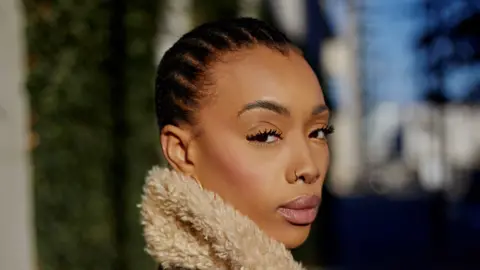 “@mami.k_photography
“@mami.k_photographyDr Lukate said afro hair had historically been ill-represented in the west and had links to slavery and colonialism, when connotations of "otherness" were used to distinguish between races to subjugate black people.
Over time, she said, this led to black women being encouraged to change themselves to fit societal expectations - often by people within the black community.
Paige, who is of Jamaican heritage, said her mum would refer to her hair as being like "Brillo pads".
"There were many times where, if you had your afro out or your hair out, you'd be told to go fix up your headpiece," she recalled.
"The hair could be really healthy, really well looked after but it's not straightened and that was the sentiment."
I had a similar experience to Paige, with my brothers poking fun at me when I first retired my hair straighteners.
"It's basically parents already internalising for themselves that natural curly hair is not acceptable, it's not beautiful, it's not attractive. It's not seen as professional... and then passing that on to their children," said Dr Lukate.
"There is a tax to wearing curly hair in a way that is seen as beautiful again by society.
"I think it's not just about having curly hair but there's certain ways of wearing your curly hair that are seen as more beautiful than others."
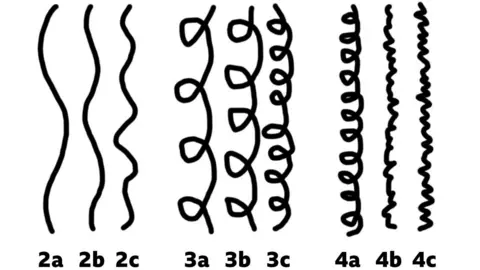
The British Beauty Council claims black and other ethnically diverse people spend, on average, 25% more on health and beauty products.
Specialist products can be very expensive - especially if you require multiple steps to wash and style your hair like I do.
My hair routine now takes about an hour and involves numerous specialists shampoos, gels, cremes and oils to make the hair 'pop'.
High-street hair brand Umberto Giannini recently used the hashtag #NoCurlTax in a social media campaign in recognition of what it called the "unfair" cost of curl-specific products, saying "having curly hair shouldn't cost more".
Finding an adequately trained hairdresser who can properly cut curls - as well as being able to afford their prices - was also an issue for Paige and many of the women Dr Lukate spoke to.
"Why is it acceptable in the 21st Century that I would have to travel from Bristol or Nottingham all the way to the capital city for one hair appointment? That's where the [curl] tax has hit me and hit my pockets hard," said Paige.
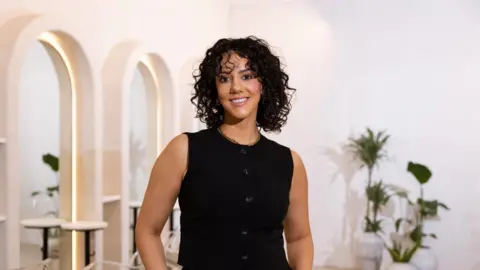 Jade Pointon
Jade PointonCurly hair specialist hairdresser Jade Pointon, from Cardiff, said it started with education.
"Many [hairdressers] have not been trained by the right teachers," she said.
"When you are trained at Level 2 you should be able to have done a variety of haircuts on different textures, but people are being passed at exams and qualified without actually cutting or styling curly hair.
"It starts at the top with the trainers. If they don't know what they're doing then they are going to avoid encouraging future stylists to get the curly and afro models in the chair.
"I think we have enough barriers in our way, not being able to find someone to cut your hair is just another example of what [black] people face."
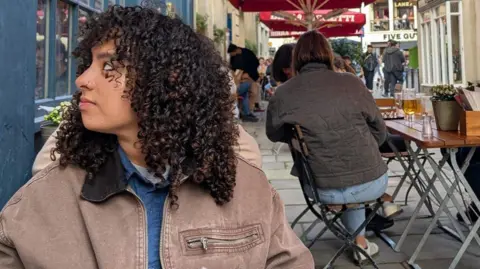 Erin Fahiya
Erin FahiyaErin Fahiya, 22, from Barry in south Wales, said had never felt pressure to straighten her hair and said that was in part because of the community she had found online.
"You start to think, why not embrace it? Why hide it? For me it was empowering and reassuring to see people that looked like me - black people embracing their natural textures and celebrating that.
"I think we need to take the focus away from straight hair and see our hair through a different lens to really see how beautiful and versatile curls are.
"For me that's important and linked to my heritage and it's important to see that on social media."
Erin's message of self-love and empowerment is what I hope to take forward and share with my own daughter.
I hope that she too will be proud of her hair and her roots.
